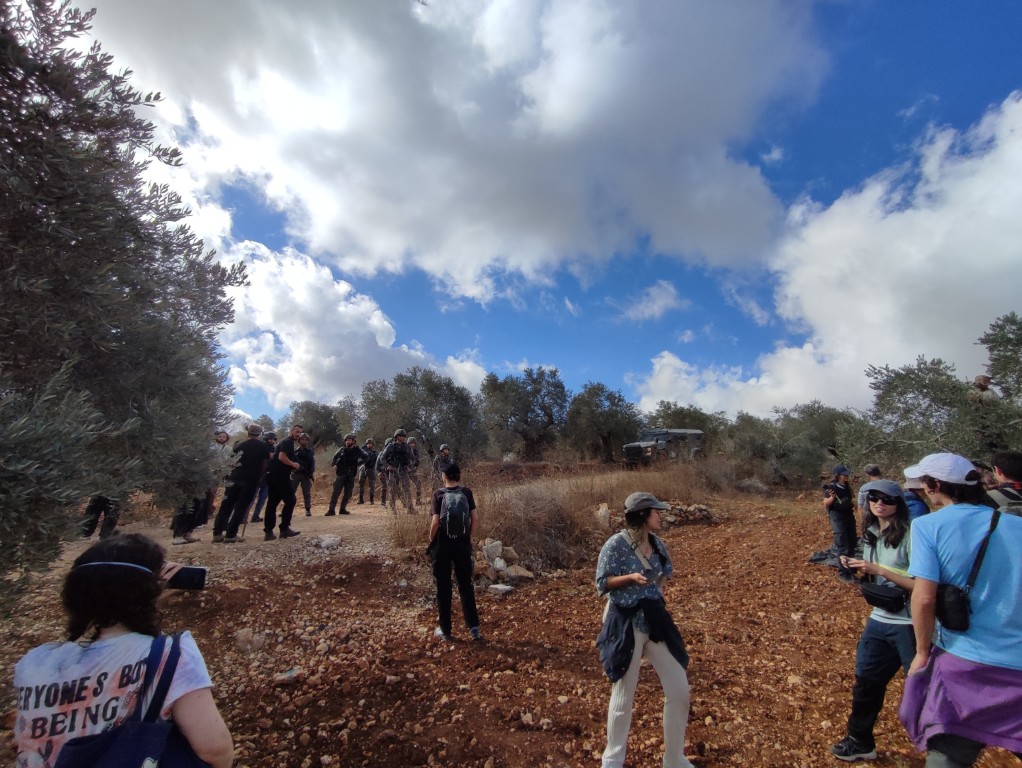In early October 2025, volunteers from eight countries arrived in Palestine (West Bank) to participate in the olive harvest, as a sign of solidarity with Palestinian farmers during this extremely important agricultural period of the year. Among them were two people from the « Routes of the Olive Tree’’, Giorgos Tsiris and Marinella Katsilieri.
The volunteers’ goal was to help protect Palestine’s vulnerable olive groves from increasing challenges, to help with the olive harvest, and to document violations in areas threatened by Israeli settler violence and land confiscation.
It is important to emphasize that the olive tree is a vital source of livelihood for thousands of Palestinian families. Under conditions of military occupation and settler violence, harvesting its fruit is an act of great symbolic significance, rooted in the history, culture, and struggle of Palestinians for their survival and to remain on their land and in their homes.
The volunteers were hosted in villages in Area C of the West Bank, where violence by Israeli settlers is most prevalent. The Union of Agricultural Work Committees (UAWC), an internationally recognized development organization that promotes cooperative action and volunteerism with the aim of providing a non-violent and non-discriminatory society, was responsible for their accommodation and participation in the olive harvest.
The chronicle of the expulsion (testimony)
‘’During the first days of our stay, Israeli settlers, in an attempt to seize Palestinian land, expand illegal Israeli settlements, and intimidate local communities into leaving, uprooted 150 olive trees in the village of Bardala, in the northern Jordan Valley, destroying the livelihoods of many families. Attacks were also carried out on Palestinian farmers in Beit Fajjar, south of Bethlehem, injuring several of them. Witnesses reported that the attackers threw stones, set dogs on people, and burned cars. On October 16, 2025, we are in the process of harvesting the fruit by hand (without mechanical means) in an olive grove near the town of Hawwara. Alerted by a settler (who was present), 10 armed soldiers initially appeared, followed by several police officers, who led us to the nearby residence of the olive grove owner, pointing their weapons at us. They took our passports and cell phones and took us to the police headquarters in the city of Ariel, where we were held in custody and interrogated. After being held overnight, we were informed that we were being charged with terrorism and taken to the detention center at Ben Gurion Airport in Tel Aviv to be deported. Five volunteers were deported before the Sabbath (10/18/2025). The rest were taken to GIVON prison, where they remained for several days, handcuffed and shackled, and were tried before being deported via Jordan.
Throughout our detention, we were not allowed to communicate with our families or our country’s embassy, nor were we allowed to communicate with each other. We were under constant surveillance by heavily armed soldiers and police officers, without access to our personal belongings and medication, without water or toilet facilities for hours on end, and subjected to constant orders, belittlement, and sarcastic comments from Israeli officials”
In conclusion…
This behavior towards a peaceful activity such as olive harvesting proves that the Israeli government is not convincing in its claim that it is fighting terrorism. In reality, it is fighting memory, tradition, and human dignity. Every olive tree that is cut down or abandoned, every child who grows up in fear of the settlers, every act of solidarity that is perceived as terrorism, demonstrates their refusal to see the other as a human being. Whether they are Palestinian residents of the West Bank or foreigners’’.
Some figures
Olive cultivation is the cornerstone of Palestinian life and economy. With over 10 million olive trees in the occupied territories, the olive sector is vital for at least 100,000 Palestinian families. However, farmers face significant threats, including land confiscation, attacks by settlers, and restrictions on access. Since 1967, 800,000 olive trees have been uprooted and tens of thousands more have been damaged by violence or neglect. In the 2023 harvest alone, more than 278,000 trees were destroyed, resulting in $10 million in losses for farmers. Ongoing restrictions and violence have made olive harvesting more dangerous, with 3,100 trees burned or cut down in 2024 alone.
Violence by Israeli settlers in the West Bank has escalated dramatically, with Area C bearing the brunt of these relentless attacks. These acts of aggression are not isolated incidents, but part of a broader strategy of driving out residents and systematically stealing land with the aim of expanding Israeli settlements and imposing control over occupied Palestinian land.
According to data from the United Nations Office for the Coordination of Humanitarian Affairs (OCHA), settlers have attacked Palestinians nearly 3,000 times in the occupied West Bank over the past two years. In October 2024, Al Jazeera reported that in less than a year, 1,423 incidents of settler violence had been recorded in the West Bank, with 321 incidents in the Ramallah and Al-Bireh governorate, 319 incidents in the Nablus district, and 298 in the Hebron district. While most of the world’s attention remains focused on the ceasefire agreement in Gaza, just a stone’s throw away, Israeli settlers, often with the support of soldiers, continue their daily attacks and raids throughout the occupied West Bank. In the first eight months of 2025 alone, there have been more than 1,000 violent attacks by settlers… indicating that this year is on track to be the most violent to date.











